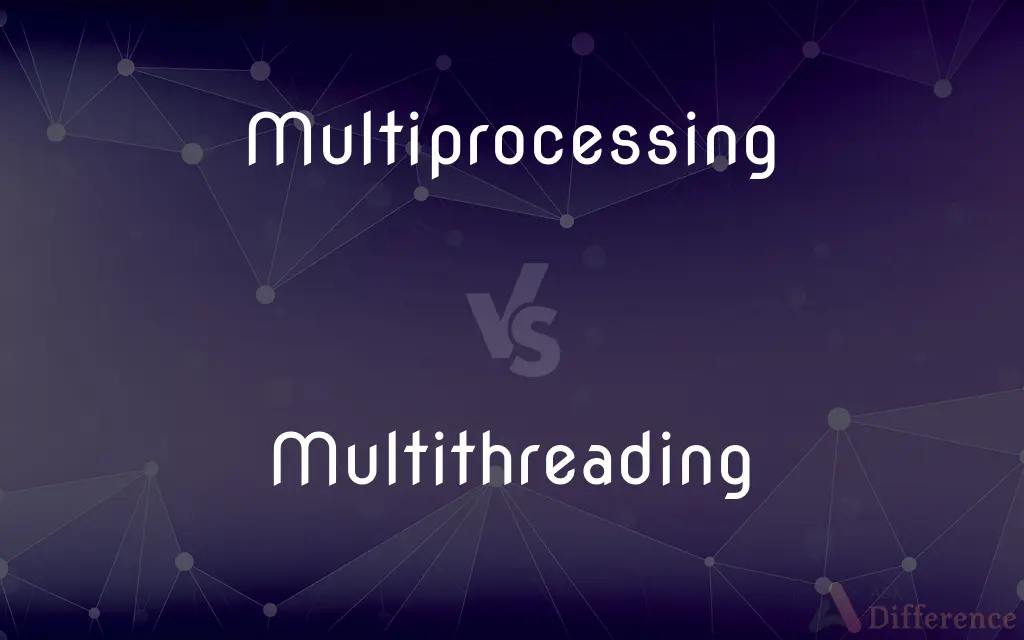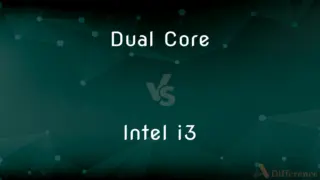Multiprocessing vs. Multithreading — What's the Difference?
By Tayyaba Rehman & Urooj Arif — Published on February 7, 2024
Multiprocessing involves multiple CPUs handling different tasks simultaneously, while multithreading splits a single CPU's processing power across multiple tasks.

Difference Between Multiprocessing and Multithreading
Table of Contents
ADVERTISEMENT
Key Differences
Multiprocessing refers to the use of two or more CPUs within a single computer system to process tasks simultaneously. Each CPU operates independently, and the process can significantly speed up computing tasks that can be parallelized. Multithreading, in contrast, involves a single CPU dividing its processing power among multiple threads. It allows different parts of a single program to run concurrently, making efficient use of the CPU's time during idle periods.
In multiprocessing, tasks are distributed among different CPUs, which can lead to better performance for tasks that are independent or minimally interdependent. This setup is especially beneficial for applications that require a lot of number-crunching or processing power. Multithreading, on the other hand, makes a single CPU appear as if it's doing several things at once. It's particularly useful in applications where tasks need to be responsive to user interactions, like graphical user interfaces.
Multiprocessing systems are typically more robust and reliable. If one processor fails, the system can often continue functioning, albeit at reduced performance. This makes it a preferred choice for critical applications where uptime is crucial. Multithreading, while efficient, does not offer this level of redundancy, as all threads share the same CPU resources. If the CPU encounters a problem, all threads can be affected.
The complexity of programming can differ significantly between the two. Multiprocessing can be more complex to implement because it often involves coordinating between different processors, which might require sophisticated synchronization mechanisms. Multithreading is generally easier to implement within a single program but requires careful handling of resources shared among threads to avoid issues like deadlocks.
From a cost perspective, multiprocessing can be more expensive due to the need for multiple CPUs, each of which might require its own memory and other resources. Multithreading is a more cost-effective way to increase the efficiency of a single CPU, as it doesn't require additional hardware.
ADVERTISEMENT
Comparison Chart
Hardware Requirements
Requires multiple CPUs or processors.
Utilizes a single CPU or processor.
Task Handling
Handles multiple tasks simultaneously and independently.
Manages different parts of the same task concurrently.
Cost
Generally more expensive due to additional hardware.
More cost-effective, uses existing CPU resources.
Programming Complexity
Often involves complex coordination and synchronization.
Easier to implement but requires careful resource management.
Failure Impact
Less impact from a single CPU failure.
A single CPU issue can affect all threads.
Compare with Definitions
Multiprocessing
Multiprocessing is the simultaneous execution of multiple tasks using multiple processors.
The data center upgraded to multiprocessing servers to handle the increased web traffic efficiently.
Multithreading
Multithreading is a technique where a single CPU runs multiple threads of execution concurrently.
The web server uses multithreading to handle multiple user requests simultaneously.
Multiprocessing
Multiprocessing is a computing approach where several processors execute or process applications or data concurrently.
The multiprocessing capabilities of the new supercomputer allow it to perform numerous tasks at remarkable speeds.
Multithreading
Multithreading refers to the ability of a CPU to manage multiple operations or threads at the same time.
With multithreading, the software can perform background calculations while still remaining responsive to user input.
Multiprocessing
Multiprocessing is the use of two or more central processing units (CPUs) within a single computer system.
The new application benefits significantly from multiprocessing, as it requires extensive parallel calculations.
Multithreading
Multithreading is a process where a single set of computer resources is shared among multiple computational threads.
The video game uses multithreading to simultaneously process AI, physics, and rendering.
Multiprocessing
Multiprocessing refers to a computing system's ability to provide concurrent processing with more than one processor.
With multiprocessing, the company's complex simulations finished in half the usual time.
Multithreading
Multithreading allows a program to operate more efficiently by doing multiple tasks at the same time within a single program.
The image processing application uses multithreading to speed up the editing and filtering processes.
Multiprocessing
Multiprocessing involves multiple processors working together to execute multiple processes simultaneously.
To enhance performance, the video rendering software utilizes multiprocessing techniques.
Multithreading
Multithreading is a programming technique that divides a process into multiple smaller threads to improve performance.
Multithreading in the database system ensures faster query processing and data retrieval.
Multiprocessing
A method of computing in which different parts of a task are distributed between two or more similar central processing units, allowing the computer to complete operations more quickly and to handle larger, more complex procedures.
Multithreading
(computing) The use of multithreaded code.
Multiprocessing
Computation using more than one processor.
Multiprocessing
Simultaneous processing by two or more processing units
Common Curiosities
What is multiprocessing?
Multiprocessing is the use of two or more CPUs in a computer to process tasks simultaneously.
How does multiprocessing enhance performance?
Multiprocessing enhances performance by parallelizing tasks across multiple CPUs, reducing overall processing time.
What is multithreading?
Multithreading is the division of a single CPU's processing power to execute multiple threads concurrently.
Can multithreading handle independent tasks like multiprocessing?
Multithreading is best for handling different parts of a single task, while multiprocessing handles multiple independent tasks.
Is multiprocessing more costly than multithreading?
Yes, multiprocessing typically requires more hardware resources, making it more expensive than multithreading.
Is multiprocessing suitable for high-availability systems?
Yes, multiprocessing can enhance reliability and availability, as multiple CPUs provide redundancy.
Can multithreading lead to resource management issues?
Yes, multithreading requires careful management of shared resources to prevent issues like deadlocks.
Can multiprocessing improve data processing speeds?
Yes, multiprocessing can significantly speed up data processing tasks that can be performed in parallel.
Can multithreading be implemented in any programming language?
Multithreading can be implemented in many languages, but support and implementation details vary.
How does multiprocessing affect system reliability?
Multiprocessing can improve system reliability as failure in one CPU doesn't necessarily halt all processes.
Does multithreading improve user experience in interactive applications?
Yes, multithreading can improve responsiveness in interactive applications by managing user interface and background tasks simultaneously.
Can multithreading make a program faster?
Yes, multithreading can make a program faster by allowing a single CPU to handle multiple tasks efficiently.
Are there programming challenges unique to multiprocessing?
Yes, multiprocessing often involves complex synchronization and communication between processors.
Is multithreading suitable for CPU-intensive tasks?
Multithreading is suitable for dividing CPU-intensive tasks but has limitations compared to multiprocessing.
Are there tasks unsuitable for multiprocessing?
Tasks that require a lot of inter-process communication may not benefit as much from multiprocessing.
Share Your Discovery

Previous Comparison
Dual Core vs. Intel i3
Next Comparison
Port Wine vs. SherryAuthor Spotlight
Written by
Tayyaba RehmanTayyaba Rehman is a distinguished writer, currently serving as a primary contributor to askdifference.com. As a researcher in semantics and etymology, Tayyaba's passion for the complexity of languages and their distinctions has found a perfect home on the platform. Tayyaba delves into the intricacies of language, distinguishing between commonly confused words and phrases, thereby providing clarity for readers worldwide.
Co-written by
Urooj ArifUrooj is a skilled content writer at Ask Difference, known for her exceptional ability to simplify complex topics into engaging and informative content. With a passion for research and a flair for clear, concise writing, she consistently delivers articles that resonate with our diverse audience.
















































